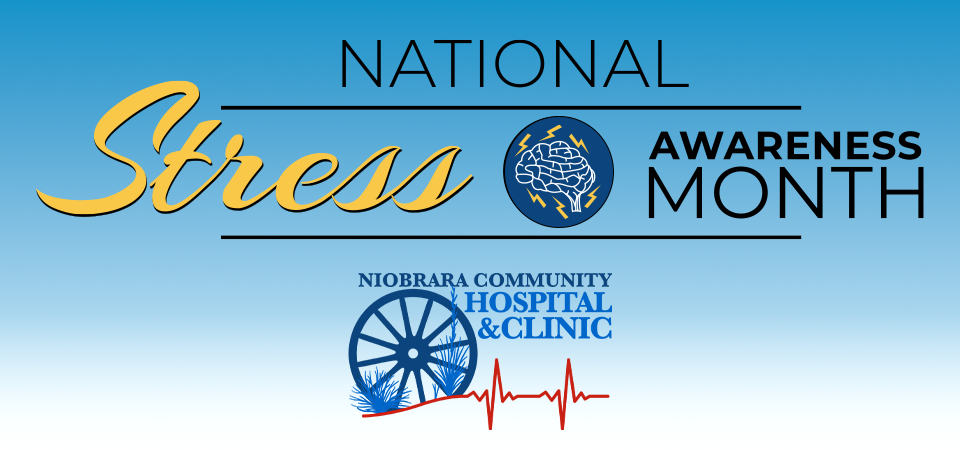Menu

April is National Stress Awareness Month, and at Niobrara Community Hospital & Clinic, we believe it’s essential to raise awareness about stress and its impact on our health. Stress can affect anyone, anywhere, but it can be particularly difficult for those living in rural communities. That’s why we want to share some information on the causes, symptoms, and ways to manage stress.
Causes of Stress
Stress can come from many sources, including work, family, finances, health, and relationships. In rural areas, there may be additional stressors, such as isolation, lack of access to mental health services, limited job opportunities, and environmental challenges like extreme weather conditions. These factors can contribute to chronic stress, which can have serious consequences for our physical and mental health.
Symptoms of Stress
Stress can manifest in many ways, including physical symptoms like headaches, muscle tension, fatigue, and digestive issues. It can also cause emotional symptoms like anxiety, irritability, mood swings, and depression. In severe cases, chronic stress can lead to more serious health problems like heart disease, stroke, and diabetes.
Managing Stress
Fortunately, there are many ways to manage stress and improve our overall health and well-being. Here are some tips that we recommend:
1. Exercise regularly: Exercise is a great way to relieve stress and improve your physical health. Whether it’s taking a walk, jogging, or participating in a group fitness class, find an activity that you enjoy and make it a regular part of your routine.
2. Practice mindfulness: Mindfulness is the practice of being present in the moment and focusing on your thoughts and feelings without judgment. It can help reduce stress and improve mental health. Try incorporating mindfulness techniques like deep breathing or meditation into your daily routine.
3. Get enough sleep: Lack of sleep can contribute to stress and other health problems. Make sure you’re getting enough sleep each night by establishing a regular sleep schedule and creating a relaxing bedtime routine.
4. Connect with others: Social support is essential for managing stress. Connect with friends, family, or a support group to build a network of people you can turn to for help and support.
5. Seek professional help: If you’re struggling with chronic stress or mental health issues, don’t hesitate to seek professional help. Talk to your healthcare provider about your concerns, and they can provide you with resources and referrals for additional support.
We understand the challenges of living in a rural community and the impact that stress can have on our health. That’s why we’re committed to providing awareness, resources, and support to our patients and their families. If you’re struggling with stress or other health issues, please don’t hesitate to reach out to us. Together, we can work towards better health and well-being for our community.
921 S. BALLANCEE
P.O. BOX 780
LUSK, WYOMING 82225
Dr. Joleen Falkenburg
Monday and Wednesday from 8:00 AM through 5:00 PM
Tuesday and Thursday from 8:00 AM through 3:00 PM
Karen Alexander NP
Monday, Tuesday, Thursday and Friday from 8:00 AM through 5:00 PM
Wednesday from 8:00 AM through 12:00 PM
Walk-Ins Welcome